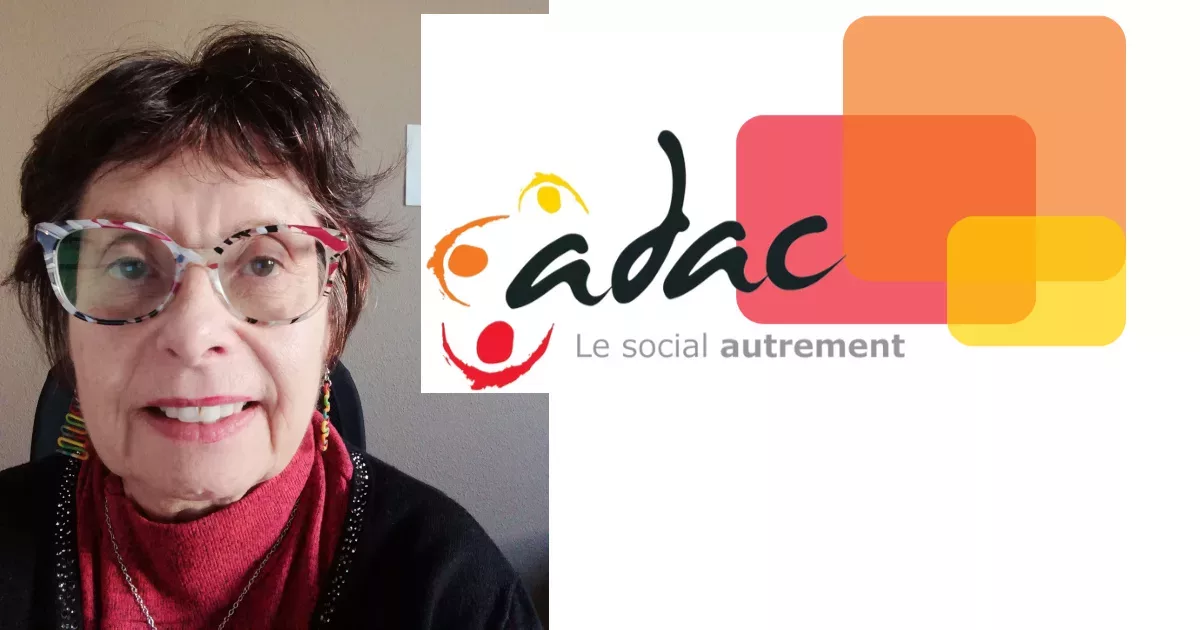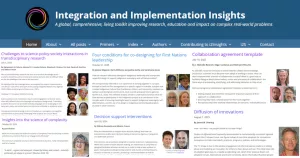Pascale Mallet: “Participating in research on one’s own practices brings more sense to the activity of social workers”
The director of an association providing social support and advice to people in need tells why they engaged in a research project about social workers practices, and why she wants to pursue this kind of actions

What is your professional activity?
Pascale Mallet: I am the director and founder of ADAC (Accompagner, Dynamiser, Agir, Créer le social autrement), an association created in 1985, which provides support services for people facing social difficulty in France. We mainly employ family economic advisors (Conseillers en Économie Sociale Familiale). Our clients are diverse: public institutions, social housing services, local authorities, associations, private companies, pension funds and social security bodies. For each service, we develop an adapted methodology, with the common goal of making the person in difficulty an active participant. We have been innovating ever since the association was founded. This has led us to develop professional training to our methodology for social workers.
Who are the people in difficulty that you support?
P. M.: It depends on the client: people with inadequate housing; pensioners on modest incomes; students; people on integration schemes; employees with budgetary problems; etc. Often, their difficulties are linked to their family’s financial situation. And they are linked to complex situations: illness, separation, unemployment of the person or their partner, poor control of budgetary expenses. There are also a growing number of people suffering from professional burnouts, who are losing confidence in themselves in all areas of their lives. We are also subsidized by the French government to welcome the public unconditionally as part of the “Point Conseil Budget” program.
One of your employees recently got a PhD with academic work she developed within the activities of the association. Why did ADAC become involved in such a project?
P. M.: Ever since ADAC was founded, we have been thinking about how to improve our practices. And for a little over ten years now, we have been carrying out action research, based on issues identified by colleagues in the field. For example, what is the impact of digital technology on social practices? How to deal with interculturality in social practices? Is social support a support to change? Within this framework, we draw on relevant scientific articles, and feedback from field practices, to define benchmarks for our work, an ethical stance, or even new actions. In 2018, we were fortunate to recruit Claire Jondeau, a social and family economics advisor, who was planning to prepare a thesis on professional practices in social action. Through a variety of circumstances, the association’s management suggested that her research field should be the structure itself. This was of interest to us, as her approach involved as co-researchers social workers and supported people.
Why hadn’t you undertaken any research projects before?
P. M.: I knew colleagues in another geographical area who had an agreement with a university. But for us field social workers, it is difficult to get in touch with academic researchers: we did not know how to go about it. Hiring this colleague, who had dual status, was an opportunity.
What kind of questions did you try to answer with this work?
P. M.: We wanted to decode what happens between a person in need and a social worker during an individual support interview, by analyzing significant sequences of the interview: the opening of the interview, the announcement of “what is left to live on”, the end of the support. It is a study of the micro-knowledge developed during the exchange, often unconsciously, by habit over the years. For example, each colleague has a particular way of introducing interviews: we decode these acts with a scientific approach, to see what this way of doing produces. During co-analysis sessions, we listen to recorded interview sequences and decode them using a combination of two methods: conversational analysis and explicitation, which puts people in the position of evoking what happened to them during the interview. A co-analysis session is therefore made up of four people: a researcher specializing in conversational analysis, a fellow researcher specializing in explicitation, a social worker and the person being supported, both of whom become co-researchers on the principle that “it is the person who does who knows”.
What does this method produces?
P.M.: When we presented this approach at the University of Saint-Étienne, a sociologist remarked that by “merely” sending out questionnaires or recording people, he had not had access to what people were thinking during the execution of the action, what they had said or done. On the other hand, social workers are accustomed to a kind of reflexive approach: the analysis of professional practice. But this “re-listening to the action in the process of-doing” allows us to revisit seemingly innocuous actions or phrases from the interview. For example, in one interview, a social worker had remained silent because she no longer knew what to propose to the person she was accompanying. The co-analysis revealed that the latter had taken advantage of this silence to reflect on her own possible solutions. The social worker’s feeling of powerlessness had in fact empowered the person she was supporting, so that she could be in charge!
Has this work already transformed the way you work?
P. M.: The colleagues involved in this project have become aware of small, systematic or unconscious gestures, actions, words or positioning, and this has enabled them to develop strategies for conducting interviews. Their self-confidence increased, they doubt less about their practice, and they dare to try out new postures and new subjects. We have also conducted shared co-analysis sessions with colleagues who have not taken part in recordings: this enables others to modify their practices, or at least to be differently aware of them, thus making a contribution to the corporate culture.
Are the results obtained transferable beyond ADAC?
P. M.: Transferability is a tricky concept. Each person and each situation are unique, and there would be little point in identifying a catalog of best practices. Each colleague has her own “researcher’s notebook”, in which she notes points of reference to help her own practice evolve according to her own appropriation and the specificity of the context. The main result of our collaboration with academic researchers, for us, is to raise awareness of the need to develop this type of action in social practices, to show the value of this type of research in helping each social worker to have a position of their own within the framework imposed on them, that they nevertheless have the power to act.
Why is this so important?
P. M.: From my point of view as a director, this research helps to motivate my team, and keep them, in a context where many social workers leave the sector and retrain, because in social action, the difficulties are such that there are no obvious solutions. Our most recent recruitments have been with professionals who have clearly expressed an interest in participating in research into their professional practices.
So the research process is more important than the results?
P. M.: We have also adapted some of our training courses, using recordings of interviews to show trainees what it is like to go into this or that field with families. Young professionals have an “interview guide”. But following it is not enough to be a “good” social worker: you also need to know how to behave. Up to now, this know-how was considered as innate. With this research, we are in the process of demonstrating that it is a professional skill, and that it can be acquired by adopting an appropriate approach. From a manager’s point of view, I would be making a mistake by imposing research objectives. Research generates change and makes people want to invest in their work, so we can consider that the goals have been achieved. The process is worth as much as the results!
Did you manage to assess an impact of this research in the academic world?
P. M.: There is some interest: we have been asked to give talk at conferences. And our application to join the Groupement d’Intérêt Scientifique Hybrida-IS has been very well received. This group of researchers who want to build bridges between field intervention and academia had no field organization among its members! In discussions at the Haut Conseil en Travail Social, we also advocate the importance that social workers take a reflective approach: some teams are under so much pressure from taking on people in difficulty that they do not take any time to discuss their difficulties; this creates bad feelings among social workers, a disengagement that employers are fortunately beginning to realize. But budgets must be set aside to organize work meetings on these issues in each structure, with psychological support. For ADAC, this represents around €30,000 a year, which is a significant amount.
Will ADAC keep on being involved in research?
P. M.: Our colleague Claire Jondeau got her PhD in January 2024. We are pursuing a new in-house research program, extending it to the analysis of group events, training initiatives and reception of people. Above all, we would like to disseminate this methodology, and train other social workers to use it. We would also like to contribute to the initial training of social workers. But professional schools do not have any specific budget for these actions.
Who funds this research?
P. M.: Up to now, ADAC, out of our own funds: that is not sustainable. Our usual funders do not fund research projects, and we are not used to apply to specialized “research” bodies. Given that this research contributes to the training of social workers, we are exploring the possibility of having projects funded by professional training funds.
Interview by Luc Allemand
SUBSCRIBE TO OUR NEWSLETTER
To stay up to date with our projects and the development of the EHC
Read more articles

Gian Francesco Giudice: “Ethical responsibility is essential in fundamental research”
From hypothetical black holes to environmental impact studies, CERN navigates risk, transparency, and moral responsibility at the frontiers of human

Dealing with the complexity of society and environment
A global toolkit for tackling complex problems with more than 600 different methods Ever wish you had a free toolkit

The Moon & the Global South: Voices, Risks & Promise
Researchers warn that without inclusive governance, the Moon could become “a new arena for old patterns of exclusion” When rockets

Borko Furht: “AI shouldn’t be given much autonomy without maintaining accountability”
Beyond Superintelligence: The Real Challenges of Keeping Humans ‘In the Loop’ Borko Furht is a professor in the department of